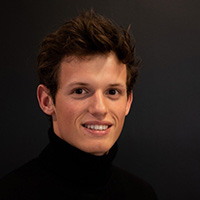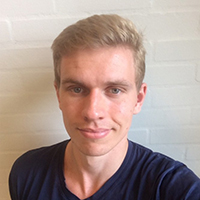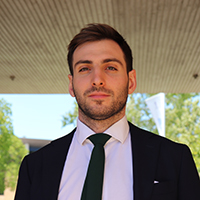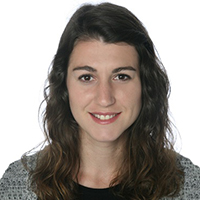Tales of jobs graduates have landed after graduation
Below you can meet 'Earth and Space Physics and Engineering' graduates and read about where they have found jobs, and what they do.
Paul Senty
Remote Sensing Specialist
DHI, Denmark
 While I originally joined the Earth and Space Physics and Engineering (ESPE) program for the space research courses, I learnt about the Earth Observation field shortly after I started. I love this field for its cross-disciplinary aspect. During my education, I had very interesting courses in a wide variety of subjects ranging from remote sensing and oceanography to deep learning and image analysis. I am grateful that DTU offers such a flexibility in designing one’s own study plan.
While I originally joined the Earth and Space Physics and Engineering (ESPE) program for the space research courses, I learnt about the Earth Observation field shortly after I started. I love this field for its cross-disciplinary aspect. During my education, I had very interesting courses in a wide variety of subjects ranging from remote sensing and oceanography to deep learning and image analysis. I am grateful that DTU offers such a flexibility in designing one’s own study plan.
My master thesis was in collaboration with DHI which then hired me in their “remote sensing and analytics” team after I graduated. Here, I continue to learn about the newest methods to monitor Earth. I design algorithms (both traditional algorithms and machine learning) and combine data from different satellites to tackle a variety of challenges. These challenges include deriving the surface water height of rivers, determining which type of crop grows on an agricultural field or detecting illegal fishing.
Mie Magelund
Application Specialist – OEM spectrometers
Ibsen Photonics, Denmark
 I specialized in space technology during my master, and now work as an application specialist in OEM spectrometers. As an application specialist, I help companies choose the right spectrometer for their exact needs, and believe me when I say the number of different applications are unimaginable. I also help with troubleshooting and programming, and I have my own research projects.
I specialized in space technology during my master, and now work as an application specialist in OEM spectrometers. As an application specialist, I help companies choose the right spectrometer for their exact needs, and believe me when I say the number of different applications are unimaginable. I also help with troubleshooting and programming, and I have my own research projects.
The ESPE provided me with many different opportunities to learn about space technology and science. Among others, I took the opportunity to learn about astrophysics, space and plasma physics, and space technology, and in the end, I discovered a passion for the development of detectors. The ESPE program also gave me the opportunity to improve my skills internationally through workshops taught by experts at ESA in Belgium, and an internship in Munich.
If you are just a little bit curious about space, I highly recommend you to consider joining the ESPE program. It provides you with much freedom to study your exact interests and gain many exciting experiences, and the experts at the institute are as well as the students very kind and accommodating people with a genuine interest in Earth and Space.
Jakob Ahl
System Engineer
Terma, Denmark

In the Earth and space Physics and Engineering programme I mostly took radar courses, and data analysis courses. I have been working for Terma for half a year now as a Systems engineer in their Radar department. In this job, there is a lot of variety. Some days are spent in front of the computer analysing data, or writing requirements / verifications modules for our projects. Other days are in the lab or in the field, where we test and build equipment.
The ESPE programme has prepared me well with a lot of general knowledge on approaching technical problems, and almost all of the skills I learned at DTU are put into practice every day.
Renée Mie Fredensborg Hansen
Young Graduate Trainee - Polar Remote Sensing Data Validation
ESA/ESRIN, Italy

Whilst at DTU, I studied the double-degree Nordic Master in Cold Climate Engineering (Space Track), where one of the degrees offered is the Earth and Space Physics Engineering (ESPE) from DTU. This double-degree provides an exceptional possibility to specialize in Earth Observation with a focus on the Arctic/Antarctic (Polar) regions, a highly relevant field within climate studies, marine navigation and for Denmark, as a Nordic country, while allowing for abroad experiences and fostering international collaboration with a one-year abroad stay at one of the Nordic5Tech universities.
ESPE provided me with tools, skills and experience of relevance to international and domestic organizations. I was offered a position as a Young Graduate Trainee at the European Space Agency (ESA) at their Earth Observation facilities (ESRIN) near Rome, Italy, in Polar Remote Sensing Validation. Here, I focus on retrieval of sea ice thickness from spaceborne sensors (altimeters and passive microwave radiometry) and participate and assist in the quality assurance activities of the EOP-GMQ section with respect to the polar domain.
While this degree allowed me to specialize in a particular field using specific sensors over a specific domain, this is only part of the ESPE degree. ESPE covers a range of different fields in the physics, monitoring and measuring of Space and Earth, allowing you to either specialize or take bits from the different possibilities that ESPE offers; and combine it to a strong profile, that can lead to a multitude of jobs.
Perrum Singh Rehal
Young Graduate Trainee - REXUS/BEXUS Systems Engineer
ESA/ESRIN, The Netherlands
Whilst studying Earth and Space Physics and Engineering (ESPE) at DTU, I pursued a specialisation in Space Weather... however, this is not the field I am currently working in.
Once I had completed the programme, I went on to work at the European Space Agency (ESA) as a Young Graduate Trainee (YGT) in the Education team as a STEM Didactics Expert for Space Technology. This ultimately meant I was applying my skill-set to come up with new and innovative ways to engage the young people of Europe in Primary and Secondary school to pursue STEM-related subjects.
Whilst in this YGT position, I was involved in the Astro Pi and CanSat programmes, and once I had completed this initial YGT year, I was offered the position of YGT Space Systems Engineer on the REXUS/BEXUS & Fly a Rocket! programme at ESA. The REXUS/BEXUS programme sits within ESA Academy and offers the chance for people in higher education (Bachelors, Masters, PhD, Post-Docs) to come up with an experiment to then fly on either BEXUS (stratospheric balloon) or REXUS (sub-orbital rocket).
The reason I started with mentioning Space Weather is that the ESPE programme offers a variety of opportunities that unlocks a multitude of jobs.
David Girou
Scientist & Project Manager
cosine measurement systems, The Netherlands
 I completed the Earth and Space Physics and Engineering Master's program in the fall of 2015 and was briefly hired as a research assistant in the astrophysics department at DTU Space before joining cosine.
I completed the Earth and Space Physics and Engineering Master's program in the fall of 2015 and was briefly hired as a research assistant in the astrophysics department at DTU Space before joining cosine.
cosine is a small company located in the Netherlands where we are developing the optics for the Advanced Telescope for High ENergy Astrophysics (ATHENA), the future X-ray telescope of the European Space Agency (ESA). There I have evolved in the last five years in an international setting with experts in various disciplines and I have the opportunity to face complex applied physics challenges every day. This environment stimulates and challenges me intensely, forcing me to develop expertise in numerous fields including space sciences and systems engineering as well as management and economics.
The knowledge and skills I acquired in the ESPE Master's program have enabled me to tackle these challenges optimally and rapidly grow into a managerial position where I can make a significant impact on major space missions. I am very grateful to the teachers and fellow students I had the chance to interact with during my time at DTU and If I am any good at my job today, it is entirely down to them.
Monica Coppo Frias
Industrial PhD - Hydrologic Remote Sensing
DTU Environment, Denmark
 After finishing the MSc in Earth and Space Physics and Engineering (ESPE), my first job was at CERN, where I developed mathematical models for geodetic data that were used in the positioning measurements for the Future Circular Collider. The ESPE program gave me a strong knowledge of inverse problems and geodesy, that was fundamental for the position.
After finishing the MSc in Earth and Space Physics and Engineering (ESPE), my first job was at CERN, where I developed mathematical models for geodetic data that were used in the positioning measurements for the Future Circular Collider. The ESPE program gave me a strong knowledge of inverse problems and geodesy, that was fundamental for the position.
Currently, I am doing my PhD at DTU Environment, in Hydrologic Remote Sensing. This position requires the use of Earth Observation data for Hydrodynamic modelling, and again inverse problems knowledge is necessary. Thanks to the ESPE program, I have learned different Earth Observations techniques that will help me during the PhD journey and application of inverse problems in Earth sciences.
While looking for a job, I got the impression that Earth Observations are more used in the industry every day, and profiles as the ones trained in the ESPE master program are more in demand.
Gustav Jørgensen
Data Scientist
ATP, Denmark

I have completed both the bachelor and master programme in Earth and Space Physics and Engineering. I graduated in the spring of 2019.
I work at ATP (pension company) as a Data Scientist in the department "Data mining and Fraud Detection". My job is to find public payouts that end up in the wrong hands. I use aids such as machine learning and statistical models to find "outliers" in data. Python and SQL are my main programming skills.
I work daily with a huge database, so it is an advantage to be able to manage and process data efficiently. One has to be curious about what kind of information can be hidden in the data. Also, it is important to be able to report and document one's work and collaborate with colleagues.
The 3 most important academic qualities I have developed in the programme, which I use in everyday life, are probably data analysis, project management and reporting. When it comes to the most important personal qualities, then it is collaboration, presentation and communication.
Lasse Lehmann
Industrial PhD - Ground-based radar system to monitor airborne drones
Terma, Denmark
 I currently work as an industrial PhD at Terma and enrolled at DTU Space. Terma delivers solutions to the aerospace and defence sector, including development of defence mechanisms for aircraft, ground & naval radar surveillance, and subsystems for satellites.
I currently work as an industrial PhD at Terma and enrolled at DTU Space. Terma delivers solutions to the aerospace and defence sector, including development of defence mechanisms for aircraft, ground & naval radar surveillance, and subsystems for satellites.
I started out working as an engineer for the company, aimed towards my current research topic: investigating a new type of ground-based radar system to monitor airborne drones, in part motivated by recent drone incursions at major airports (for instance Gatwick in Dec 2018). The skills I have obtained with the ESPE program are very much in line with my current tasks: performing literature studies, planning and executing experiments with hardware, data and signal processing, programming to solve the former and build program modules and simulation work in high-level program languages such as Matlab and Python.
People with other degrees can certainly also fulfil the same tasks, but ESPE preps students across a multitude of fields, enabling them to solve a great variety of tasks. Speaking from experience, we have also had some great student projects with ESPE students in the company, spanning a multitude of areas such as signal processing, machine learning and electronics, with students finding work at Terma afterwards.
While ESPE may not be a "one-shoe-fits-them-all", it certainly opens many doors, and if you have a general idea of which direction you want to go, you have the opportunity to tailor the program to a great many different exciting projects!
